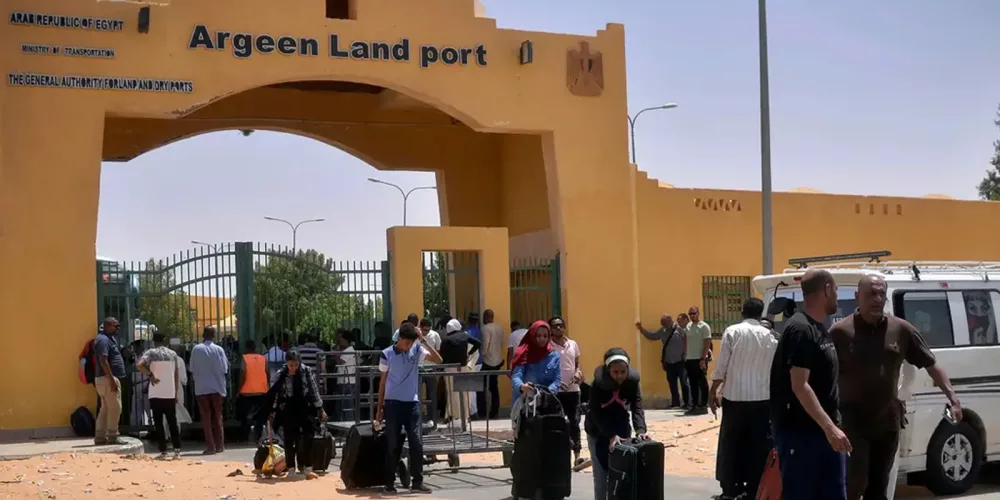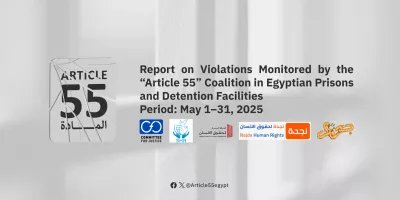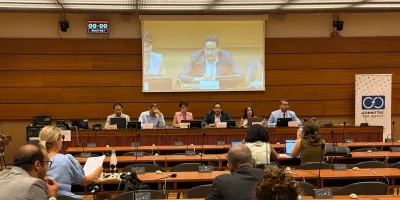The “Committee for Justice” (CFJ) and “Global Detention Project” (GDP) have stated that the Egyptian authorities are exploiting legal and judicial amendments to legitimize violations against refugees and asylum seekers. This represents a significant escalation in the repressive policies pursued by the Egyptian authorities through the new asylum law, approved by the Egyptian Parliament on November 19, 2024. The law paves the way for a new phase of violations, including discrimination, legal restrictions, and infringements on the fundamental rights of refugees, in clear disregard of international standards.
This was highlighted in an urgent appeal submitted by CFJ in collaboration with the GDP to the Office of the United Nations High Commissioner for Human Rights, the Committee on Migrant Workers, the Special Rapporteur on the Human Rights of Migrants, the UN Working Group on Arbitrary Detention, the Special Rapporteur on the Rights of Refugees, the Committee on the Rights of the Child, the Special Rapporteur on Trafficking in Persons, the Special Rapporteur on Torture, and the European Union Agency for Fundamental Rights. The appeal emphasized that the new asylum law, passed without consultations with civil society organizations or international institutions, reflects a purely security-driven approach that neglects the humanitarian aspect of the crisis.
Key Provisions of the Law
The appeal highlighted that the law seeks to transfer the management of refugee cases from the UN High Commissioner for Refugees (UNHCR) to a governmental body known as the “Permanent Committee for Refugee Affairs.” This committee, according to the law, is granted broad and ambiguous powers to make decisions regarding refugees without clear standards or adequate legal safeguards.
The appeal also noted one of the more concerning provisions of the law: the clear discrimination between refugees based on their mode of entry into the country. Those who enter legally are allowed to submit their applications within 12 months, while those entering irregularly must file within 45 days, posing significant challenges for individuals fleeing conflict and humanitarian disasters.
Legal and Humanitarian Challenges
The new asylum law introduces several legal and humanitarian concerns that threaten the rights of refugees in Egypt. These include:
- Absence of Legal Protections: The law lacks basic safeguards, such as the right to legal counsel or interpreters during application and appeals processes, undermining refugees’ ability to defend their rights.
- Excessive Security Interference: The law grants executive authorities broad and undefined powers to intervene in refugee cases based on vague reasons such as “national security” or “disrespect for social values,” exposing refugees to arbitrary decisions.
- Exclusion of UNHCR’s Role: By sidelining UNHCR, Egypt’s asylum mechanism loses transparency and international expertise essential for protecting refugees’ rights.
- Systematic Discrimination: The law imposes strict and unfair criteria for handling refugees based on their mode of entry, contrary to Article 31 of the 1951 Refugee Convention, which prohibits penalizing refugees for irregular entry.
Escalation of Violations: Detention and Deportation
Amid growing humanitarian crises in Sudan and neighboring countries, human rights organizations have documented a significant rise in detention and forced deportations of refugees in Egypt. Since the outbreak of conflict in Sudan in April 2023, over 9,000 refugees have been detained as of October 2024, with increasing reports of forced deportations involving women, children, and individuals holding protection documents issued by UNHCR.
These practices violate the principle of non-refoulement under Article 33 of the 1951 Refugee Convention. Moreover, reports indicate that refugees are detained in inhumane conditions in temporary facilities lacking minimum health and humanitarian standards.
Humanitarian and Regional Implications
The new law and the security-driven approach to refugee management threaten to exacerbate the humanitarian situation in Egypt and the region. Refugees in Egypt—whose numbers exceed one million—already suffer from inadequate access to essential services such as education and healthcare. Forced deportation policies return refugees to active conflict zones, endangering their lives and worsening humanitarian crises in their home countries.
Additionally, this approach creates tensions between refugees and host communities, as the new law fosters social isolation and places refugees in increasingly precarious situations. This pushes some to attempt dangerous migration routes through Libya or the Mediterranean.
The Role of the European Union
The European Union’s financial and strategic support for Egypt’s migration management risks enabling practices that violate refugee and human rights, such as arbitrary detention and forced deportations, underscoring the need for stronger accountability measures.
Recommendations to Address Legal and Humanitarian Flaws
CFJ and the Global Detention Project, in their urgent appeal, called on UN mechanisms and the international community to take immediate action to pressure the Egyptian authorities to ensure the following:
- Reform of the New Asylum Law
The organizations urge a review of the newly enacted asylum law to align it with international obligations, particularly the 1951 Refugee Convention. They stress the need for amendments to ensure transparency and prevent arbitrary decisions that expose refugees to discrimination and violations. Legal safeguards, including access to legal counsel and interpreters, must be provided during all stages of the asylum process, with a commitment to non-discrimination based on mode of entry. - End Arbitrary Detention and Forced Deportations
The organizations emphasized halting the arbitrary detention and forced deportation of refugees and asylum seekers, especially women and children. These practices contravene the principle of non-refoulement, which prohibits returning refugees to conflict or danger zones. They also called for allowing international organizations and independent monitors to access detention centers to assess humanitarian conditions and protect detainees’ rights. Legal mechanisms should be established to allow detainees to challenge detention or deportation decisions before independent courts - Enhanced Protection for Refugee Children
Recommendations include safeguarding refugee children from detention and providing humanitarian alternatives, such as community housing. Access to education and healthcare on par with Egyptian children should be guaranteed regardless of legal status. Refugee families and children must not be deported to conflict zones, with the provision of stable and secure environments ensuring their basic rights. - Improved Access to Public Services for Refugees
Authorities must ensure non-discriminatory access to public services such as education and healthcare. Procedures for residency and work permits should be simplified to support refugees’ self-reliance and societal integration. A robust legal framework must be established to protect refugees’ personal data and prevent its misuse. - Ensure Accountability in EU Support to Egypt: CFJ and GDP request that the European Union condition financial and technical assistance to Egypt on the cessation of human rights violations against refugees and asylum seekers. The EU must ensure that its migration management partnership with Egypt does not facilitate arbitrary detention, forced deportations, or discrimination, but rather adheres to international human rights and refugee protection standards.
- Strengthened Role of the International Community
CFJ and the Global Detention Project urge the international community, particularly the European Union and donor countries, to exert diplomatic and financial pressure on the Egyptian government to respect refugee rights. They also recommend involving international organizations, such as UNHCR, to monitor humanitarian conditions and provide technical and logistical support to Egypt’s asylum system. Legal and safe resettlement pathways for refugees in third countries should be established to alleviate Egypt’s burden and safeguard refugees from violations.






